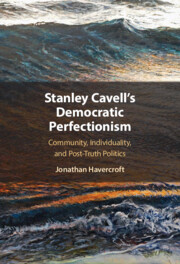Book contents
- Stanley Cavell’s Democratic Perfectionism
- Stanley Cavell’s Democratic Perfectionism
- Copyright page
- Contents
- Acknowledgments
- Abbreviations
- Introduction
- 1 The Claiming of Community
- 2 Stanley Cavell as Methodologist
- 3 Two Kinds of Agreement in Democratic Theory
- 4 The Politics of Tragedy, Recognition, and Acknowledgment
- 5 Film, Gender, Gaslighting
- 6 The Limits of Democratic Perfectionism
- Conclusion
- Bibliography
- Index
1 - The Claiming of Community
Published online by Cambridge University Press: 17 August 2023
- Stanley Cavell’s Democratic Perfectionism
- Stanley Cavell’s Democratic Perfectionism
- Copyright page
- Contents
- Acknowledgments
- Abbreviations
- Introduction
- 1 The Claiming of Community
- 2 Stanley Cavell as Methodologist
- 3 Two Kinds of Agreement in Democratic Theory
- 4 The Politics of Tragedy, Recognition, and Acknowledgment
- 5 Film, Gender, Gaslighting
- 6 The Limits of Democratic Perfectionism
- Conclusion
- Bibliography
- Index
Summary
To demonstrate the centrality of politics in Cavell’s philosophy, this chapter examines Cavell’s treatment of the foundational political theory concept of the social contract. Cavell’s analysis of the social contract appears near the beginning of his magnum opus The Claim of Reason in the context of his interpretation of philosophical criteria. He draws an analogy between our certainty in the validity of criteria when making an epistemological judgment and our obligation to obey the laws of our community. This surprising connection raises two important questions: Where does my capacity as a member of a community to speak on behalf of the community come from? And, how can I as a citizen be party to an agreement that I have no recollection of making? Classical approaches treat the social contract as the answer to an epistemological problem: How do I know what my obligations to the state are? This framing sets up the social contract as a false choice between obedience and rebellion. Cavell argues that the epistemological approach to the social contract generates this ambivalence.
- Type
- Chapter
- Information
- Stanley Cavell's Democratic PerfectionismCommunity, Individuality, and Post-Truth Politics, pp. 26 - 54Publisher: Cambridge University PressPrint publication year: 2023



